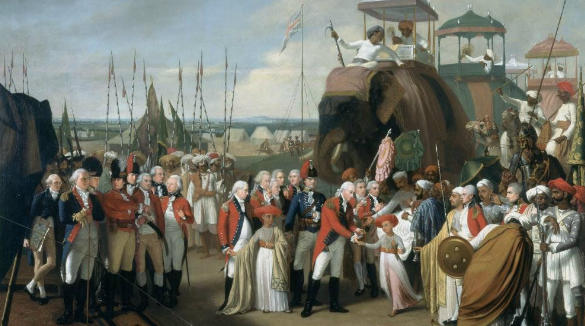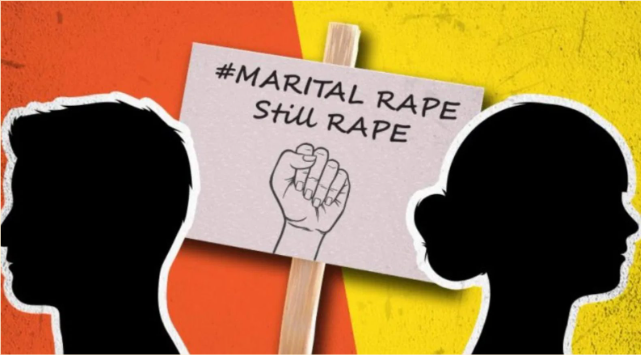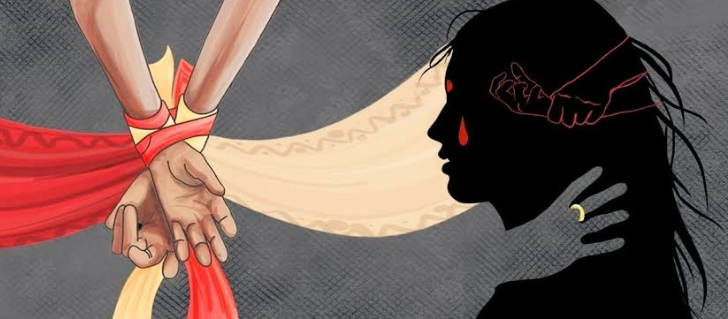INTRODUCTION
As India steps into its 76th year of Independence, we are still trying to progress in achieving due gender justice in our civil society. While we may be extremely high and proud of our historical milestones, we still have to do right by ‘our women’.
The issue of criminalizing marital rape has been in much contention these days. The problem was brought to the core of the mainstream when the Delhi High Court heard the case in May 2022 delivering a split decision on this form of sexual abuse. The two judges, Justice Rajiv Shakdher and Justice C. Hari Shankar delivered opposing verdicts on the case on May 11, 2022.
While the whole world is advocating for women’s rights, India is still among the 32 countries that have not criminalized marital rape.
ORIGIN AND BACKGROUND
The status of a married woman in Medieval England and Europe was nothing more than just a ‘personal possession.’ A woman’s identity was chained to her husband’s and any harm to her boundaries and consent was considered to be an attack on the husband’s integrity. A woman in those times, had no legal identity of her own.
Later, The Implied Consent Theory of Sir Mathew Hale, who was an English Judge, wrote in his book- “The History of the Pleas of the Crown”, published in 1736, stated that a husband cannot be held guilty of any forceful sexual intercourse upon his lawful wife, considering that the wife had given herself into ‘this kind’ of a mutual contract of marriage by her consent.
Also according to the Unities theory in earlier times, a married woman was merely a ‘chattel’ of her husband. It was nearly deemed impossible for a man to be raping his wife under the contract of marriage, considering that marriage gave him unlimited rights over her body. Thus, marital rape was never a thing in Medieval Europe.
The Doctrine of Coverture, a legal doctrine in common law stated that a woman’s legal rights and obligations were subsumed by those of her husband, following the wife’s legal status of the ‘feme covert’, implying they are ‘one’.
Further, in a hearing in England during 1707, it was stated that a woman should be obliged to owe a ‘consortium’ of legal obligations to her husband, in return for the support and protection granted by him.

PRESENT-DAY CONTEMPLATIONS
The Indian Penal Code was drafted in the 1860s under the draconian Victorian regime, which was tied down by the shackles of patriarchal forces. In light of such influence, Section 375 which defines rape has two exceptions to it. Marital Rape is under the second exception. That implies, if a husband forces his wife without her consent to engage in any sexual activity, he cannot be held guilty for the same. Such sexual abuse is permissible in India and not legally punishable. Women’s rights activists and lawyers have been protesting against this exception hoping it gets scraped down by the Highest Court of India.
If a married man in today’s India forces his wife to have sexual relations without her consent, that is deemed correct and the husband would be allowed to walk free on the Earth. On the other hand, if the same man forces a woman outside of marriage for sex, that would be regarded as rape. This is a major breach of ‘equality before the law’, as promised in Article 14 of the Indian Constitution.
Also according to the National Family Health Survey, nearly 1 out of 3 women have been abused sexually by their spouse. Almost 82% of the women who reported sexual abuse, were harassed by their current or former husbands. Thus, the successful resolution of the issue becomes extremely important.
APPREHENSIONS IN LEGALIZING MARITAL RAPE
The Central Government of India in an affidavit to the Delhi High Court in 2017, wrote that criminalising marital rape may destabilize the institution of marriage. Citing Section 498A of the IPC, the Centre argued that marriage is a sacred institution that might be disturbed if this is legalized. This is also an attribute that is in stark opposition to Indian Culture.
Another major argument levelled against the cause by many Men’s rights advocates is this, granting autonomy to women within a marriage might lead to more false cases against men leading to injustice. This is because anything which happens within the personal space between a husband and a wife cannot be attested to or proved legally. That would be extremely unfair on the part of ‘innocent husbands’ being held guilty of such crimes.
Further, this stance has been deferred to as motivated by ‘THE WEST’, claiming that criminalization of marital rape would impede gender justice as men would continue to suffer. Such allowances would lead to the collapse of marriage as an institution resulting in more and more divorces. This would also be a deterrent to the tying fabrics of our Indian Culture.
THE OTHER SIDE

The other side of the table proposes, that even though marriage is a societal and mutual contract, it still cannot be used as an instrument of oppression to snatch the autonomy and agency of a woman. Bodily autonomy is a fundamental right and consent is primary in marital or non-marital affairs.
According to a study, this also leaves a devastating impact on the mental health of a woman. The act of violence meted out to them makes them feel like nothing more than sexual objects. All of this leads to poor mental health and depression among women who have to constantly live with their rapists within four walls of the home.
Most importantly, this is unconstitutional concerning equality before the law. Ensuring justice for all sects of society is the prime responsibility of the Legislature, Executive, and Judiciary. The pure sacraments of the binding nature of Law and Order of the country would be disbarred if a married woman continues to suffer.
CONCLUSION
It is disheartening that women, who have been accorded the highest position in Indian culture continue to suffer while men guilty of such crimes continue to roam the streets freely. The continuous exemption of marital rape from the purview of common law reflects how our society continues to be dictated by the binding forces of patriarchy.
While the case goes to the Supreme Court for Hearing, women in India still await justice from the Jury. This is an extremely important step in achieving gender justice and securing women’s rights inside and outside of marriage.
-Bhawini Srivastava
Must Read: IMPACT OF 5G RADIATIONS ON THE ENVIRONMENT


